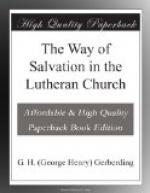Undoubtedly one of the greatest and most important of these religious movements was that one which swept over Presbyterian and Congregational Churches of New England, New Jersey, Pennsylvania, and Virginia, about the middle of the last century. It is generally known, and spoken of as “the great awakening.” Its leading spirits were such staunch and loyal Calvinists as Jonathan Edwards, the Tennents, Blair, and others. In the matter of doctrinal preaching and instruction it was certainly very far in advance of the so-called revivals of the present day. And yet in many of its direct results it was anything but salutary. It was the principal cause of the division of the Presbyterian Church into Old and New School.
Let us hear what some of the eminent theologians of these Churches say of the results of “the great awakening:”
Dr. Sereno E. Dwight, the biographer of Jonathan Edwards, and one of his descendants, says: “It is deserving perhaps of inquiry, whether the subsequent slumbers of the American Church for nearly seventy years may not be ascribed, in an important degree, to the fatal reaction of these unhappy measures.”
Jonathan Edwards, himself the most zealous and successful promoter of the whole movement, in 1750, when its fruits could be fairly tested, writes thus:—“Multitudes of fair and high professors, in one place and another, have sadly backslidden; sinners are desperately hardened; experimental religion is more than ever out of credit with the far greater part, and the doctrines of Grace and those principles in religion that do chiefly concern the power of godliness are far more than ever discarded. Arminianism and Pelagianism have made strange progress within a few years.... Many professors are gone off to great lengths in enthusiasm and extravagance in their notions and practices. Great contentions, separations, and confusions in our religious state prevail in many parts of the land.”
The above is from a letter to a friend in Scotland. We give also a brief quotation from his farewell sermon to his church at Nottingham:
“Another thing that vastly concerns your future prosperity is that you should watch against the encroachments of error, and particularly Arminianism and doctrines of like tendency.... These doctrines at this day are much more prevalent than they were formerly. The progress they have made in the land within this seven years (i.e., since the revival), seems to have been vastly greater than at any time in the like space before. And they are still prevailing and creeping into almost all parts of the land, threatening the utter ruin of the credit of those doctrines which are the peculiar glory of the Gospel and the interests of vital piety.”
Dr. Van Rensselaer, in commenting on these and other serious words of the great Jonathan Edwards, says:




